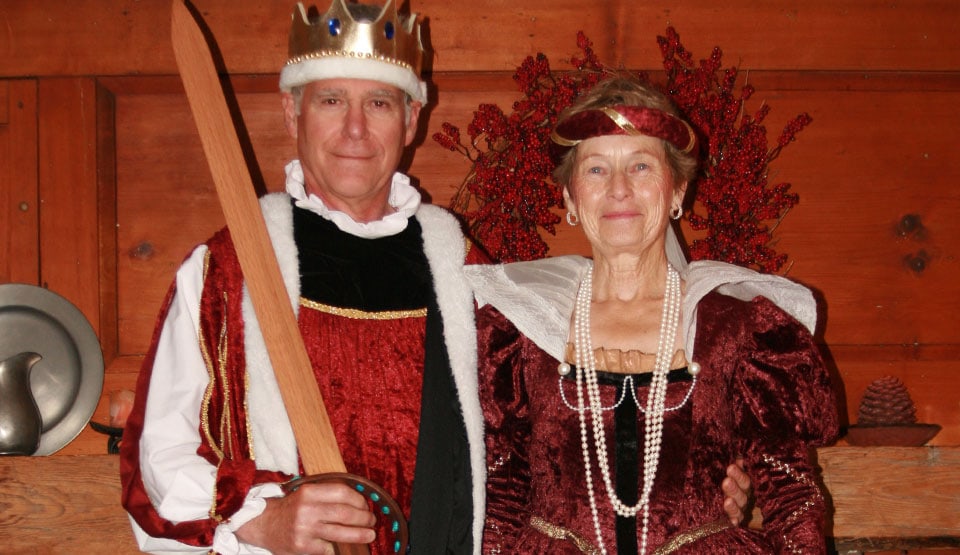Phil and Ginny live and work high on a hill in Lyndeborough, New Hampshire, in a 1750s home they’ve transformed from a fixer-upper into a classic beauty surrounded by woodland, pasture and thriving gardens. Phil bought the place in 1967, taking down the barns and – with his engineer’s mind – learning through their deconstruction and reconstruction how they had been built.
“You could see from the old buildings what worked and what didn’t,” Phil says.
He started imitating the work for other structures – rebuilding his and other barns on properties where they were wanted — then went on to make them from scratch. He admired the skill of the old-time craftsmen who were able to built strong, beautiful frames that formed a strong structure. The old-style craft was fascinating to him – but also time-consuming.
“I’m the kind of person who likes to tinker, and I thought, ‘phew! There’s got to be a quicker way to do this!’ ” Phil says.
That “tinkering” resulted in a one-of-a-kind cutting machine that takes information from 3D CAD models straight to the timbers. Phil credits clients with helping him create the machine: Many of them at that time also were engineer types and eager to make suggestions and talk about available technology. Phil’s own unique way of thinking helped: “I happen to have a knack for designing crazy machines.”
Still, timber framing wasn’t Phil’s first career. He started off building more conventional houses until serving in the U.S. Marines. When he left the service, he started teaching at Lyndeborough Central School – fifth and sixth grade. He was also, simultaneously, the tiny school’s janitor and principal. He later taught at High Mowing School, a Waldorf high school, which the Brookses continue to support to this day — Phil was on that school’s board of directors for 15 years.
Ginny moved to Lyndeborough in 1973 and joined the family and company in 1981, keeping the books and the office in order.
“He had everything in a shoe box,” Ginny recalls. “That’s when we got organized.”
She and Phil quickly became a team on the job, running a busy home, farm, family and business together.
Most of their friends are people they first met in their kitchen to discuss a future home, and they consider the company’s workers a kind of family. Ginny makes each employee their favorite meal on their birthday, and everyone gets together at the house to feast and celebrate.
Phil says it was important for the couple to create a company that stayed small enough to have personal contact with customers and to have daily contact with employees. S.P. Brooks, now Brooks Post & Beam, offered profit-sharing, exceptional pay and benefits, and a non-confrontational atmosphere for its employees. Everyone meets each morning to plan the day and knock around ideas, and each member of the team is treated with respect.
In return, employees go the extra mile for Brooks, doing whatever is needed to keep the operation running smoothly – even mowing the lawns, repairing the trucks or taking home excess produce from the gardens!
“I value very much having a strong relationship with our employees, and that’s just not possible when you have a lot of employees and a lot of turnover,” Phil says. Keeping the company small “has enabled us to basically run this business off the kitchen table.”
“A customer can sit down with someone with my experience – I’ve been doing this for 40 years – and talk about what they need.”
While building over 500 homes, Phil never borrowed money to start or operate the business. S.P. Brooks never needed to lay off employees.
Passing control of the company to Paul Freeman, who had been designing homes for S.P. Brooks for many years, and who wrote the CAD software that made the operation even more efficient, was an easy decision to make. Paul had been working from a home office in Springfield, Vermont. It took some convincing, but he moved to Lyndeborough in 2003, and bought the company in 2006.
“He just took on more and more responsibility and I took on less. The transition was better than either of us could have hoped for,” Phil says. “Paul treats the guys like we used to. You hope that it will continue on with the same values that you have invested in it, and he’s done that.”
Phil and Ginny haven’t gone anywhere, though. They still meet with a few potential clients – still at the kitchen table.
Phil has built several timber frame duplex buildings as “R&D” for Brooks, and Ginny also runs their property management business (Phil calls himself her maintenance man).
In his “spare time,” Phil restores old English cars, and tools around in a Triumph TR-4 convertible when the weather’s fine. He and Ginny also have been restoring an old farm on nearby property they purchased to keep it from development.
“I did it totally using the old tools I used to use,” Phil said. “I could take my time and have fun with it.”
They’ve placed conservation easements on over 100 acres of land in New Boston and Lyndeborough.
The couple’s organic gardens are the stuff of legend – fruit from the trees, vegetables, herbs and flowers overflow during the growing season. At one time they raised their own eggs, dairy and meat here, mainly because they wanted their children to know where food comes from.
“You have a connection to the food when it’s not coming from a package,” says Phil.
Now they just keep the cows as picturesque pets.
The Brookses have four children who work at everything from computer system designs to instructing helicopter pilots to training horses and selling real estate.
